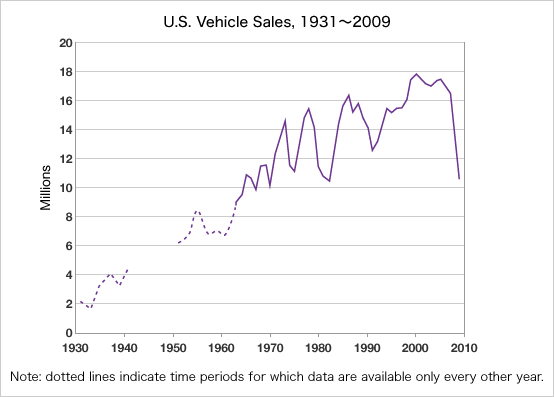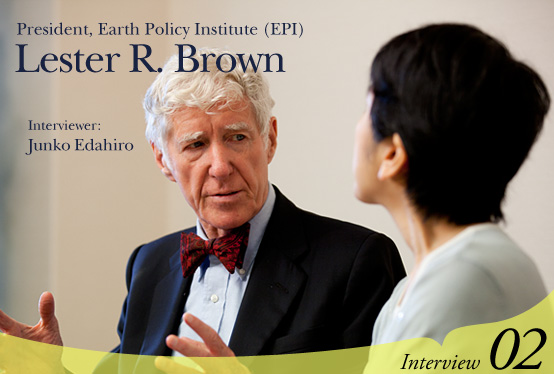- Lester :
- But we are also moving into a new period in terms of how young people think about cars. When I was a youngster, in order to socialize, particularly if you lived on a farm, you would get in your car or your pick-up [truck], whatever you had, and you would pick up some other kids. You would just drive around and see what was happening. That was how we socialized, because that was the only way we could get together. But I can't imagine some teenager living in Washington DC getting in a car and driving around now. Or in Tokyo, you know.
- Junko :
- Yes, right.
- Lester :
- So what's happening now is that young people socialize over the Internet. There was a survey in Germany among people aged, say, 19 to 39, that said, "If you have to choose between a smartphone and a car, which would you choose?" The overwhelming majority said, "a phone."
- Junko :
- Amazing.
- Lester :
- It represents a shift in thinking. My own sense is that in the United States, the U.S. automobile fleet is probably not going to grow very much anymore and it may now actually decline.
- Junko :
- That's right.
- Lester :
- Because many teenagers don't bother to get a driver's license. They have no interest in driving cars.
- Junko :
- I think the situation is the same in Japan. Car dealers in Japan are desperately trying to sell cars to young people. But many young people say that owning a car isn't as "cool" as it used to be. You can have car-sharing or rent a car. So you don't have to own the car. So I think the basic values have been changing, especially among young people. I think if people are shifting from cars to bicycles, of course, it decreases the environmental burden on the Earth, but at the same time, it will increase the level of happiness. I think that is what you wrote in your newsletter. If you are driving a car, it is difficult to talk directly with someone in another car. But if you are on bicycle, when you stop at a traffic light or something, you can talk directly to the person on the bicycle near you.
- Lester :
- Right. Instead of blowing your horn out of frustration you can actually talk with them!
- Junko :
- (Laughs.) So it will increase the level of happiness.
- Lester :
- One of the things we see in the United States is that the real estate developers had convinced people that they needed bigger houses. The idea that you have to have all these rooms was sort of a status symbol. But you couldn't use so many rooms. So we were seeing cars getting larger, now they are getting smaller. Houses were getting larger, now they are starting to get smaller. There are some value changes. People are beginning to ask questions. But it is only the beginning of the longer term process.
- Junko :
- Right. I think among many countries in the world, Bhutan took the lead. They said that Gross National Happiness, or GNH, is the most important thing for countries. Not GDP or GNP. And this is not only a Bhutanese idea. For example, the French President commissioned a report on happiness. He is saying that we should not only look at GDP. The French government is focusing on the level of happiness among its people as a measure of progress. Likewise, in the UK, the Sustainable Development Commission created a report on "Prosperity without Growth." So it's not only the Bhutanese. Increasingly, advanced countries are looking at new notions about well-being and happiness. Why now are we seeing these changes?

Photograph: Shinichi Tsuji (founder of the Sloth Club)
- Lester :
- I know that in the United States, there have been surveys about how people feel and whether they are happy or not. And the interesting thing is that they started these in 1950s. And there has been no increase in the level of happiness in the United States over the last half-century. Even though the amount we consume has doubled, tripled and quintupled. So it is clear that consumption does not necessarily lead to more happiness. I mean, if you are starving to death, obviously it does. But after a point, it doesn't.
- Junko :
- I think that people are making a greater distinction now between happiness and consumption. But if we talk about these issues with people in industry and corporate leaders, many of them believe that GDP growth is something they have to pursue. This obsession with GDP or growth in GDP has been creating many issues because this leads to more consumption, more production and more environmental burden. How do you see the idea of GDP growth and people's obsession about it?
- Lester :
- If you are in industry, and you want to be viewed as a success, your company has to grow. Your profits have to grow. So we have a basic problem with the system, which is too growth-dependent, in a sense. That's going to require some rethinking. Exactly how that is going to work its way through the system I'm not sure, but if people begin thinking that they don't want to consume more and more of everything, they want a simpler life they can enjoy, they can literally enjoy life more. Then the companies wouldn't have a problem sustaining growth in the areas where they are today.
- We are seeing this in automobile industry in the United States, for example. Our automobile production capacity today is much less than it was five years ago. It's probably going to decline more. So that is one way in which this obsession with growth is checked. If people decide that they don't want more and more cars then the automobile companies can't keep growing and selling more and more cars. So this is a major sector where we are seeing this kick in. My own sense is that whereas six or eight years ago, we were selling 17 million new cars a year in the U.S., this year it may be 13 million.
- Junko :
- Really?
- Lester :
- Last year, it was 11.5 million. I don't think we will ever go back to 17 million. If that is the case, it means the U.S. fleet will start shrinking one of these days.

Source: Earth Policy Institute; Ward's Automotive Group
- Junko :
- For companies, how they can survive? I mean, if they are relying on the old yardstick to measure progress or success, they can't do very well. How can they change? Is there any alternative?
- Lester :
- It is not clear how this is going to sort itself out. I mean if we look at the automobile sector in the U.S. certainly and in Japan and in most of the world, not all the world yet, because in China the automobile industry is growing in leaps and bounds. At some point, that will come to an end, too. I remember doing a seminar for graduate students in Tsinghua University in Beijing a few years ago. I was saying, you know, China is never going to have three cars for every four people like the United States. And the graduate student said, "You know, but this is our dream. This is what we want." I said, "If here in China, you succeed one day, in having three cars for every four people, you will not have a dream. It will be a nightmare."
- Junko :
- (Laughs.)
- Lester :
- Because at that point, you will have more cars in China than there are in the whole world today. And you can't imagine the traffic jams. I mean there is no way it is going to happen. Right now, you get the impression of automobile sales going up in China, and it's going to keep going. But it's not. They will discover, as we have discovered in Japan and the United States, that at some point, continuing growth in the number of cars is not the answer to anything, except for traffic congestion.






